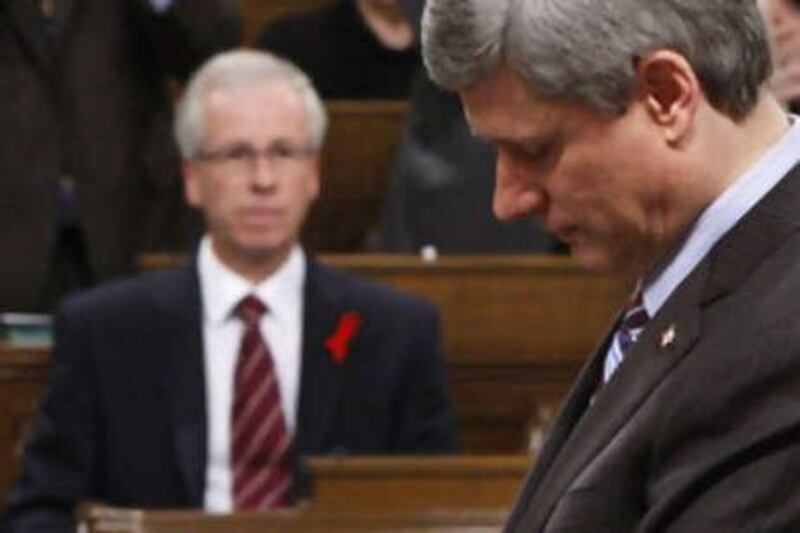OTTAWA // The Canadian prime minister Stephen Harper faces two highly unpalatable choices after opposition parties signed an unprecedented deal yesterday to bring down his minority Conservative government. The opposition, which says Mr Harper is not doing enough to tackle the financial crisis, has its eyes set on a confidence motion due for a vote in Parliament next Monday. The Liberals, New Democrats and separatist Bloc Québécois signed a formal agreement designed to keep them in power until June 30 2010. They promised a major stimulus package as well as help for the struggling auto industry.
Mr Harper, facing the worst crisis since winning power in January 2006, could temporarily suspend Parliament until a budget the government has promised for Jan 27. Or he could let the confidence vote go ahead and run a big risk of losing. CTV television quoted Harper as telling a private meeting of Conservatives yesterday evening that he would take every legal option possible to stop what he called an "affront to Canadian democracy".
Mr Harper won a strengthened minority in an Oct 14 election and says he should be allowed to govern. To suspend Parliament, Mr Harper would have to approach Governor-General Michaelle Jean ? the personal representative of Britain's Queen Elizabeth, Canada's head of state. Allan Tupper, a professor of politics at the University of British Columbia, said a suspension would be unjustified. "It would be seen solely as a bid to escape the House of Commons (elected chamber). I don't see an upside to that ... the government would be severely weakened," he said.
The three opposition parties are also angry that Mr Harper last week tried to eliminate public financing for political parties, a move that would hit them particularly hard. Mr Harper is upset that the coalition would have to rely on the Bloc Québécois, which wants to break up Canada. The opposition parties said the new prime minister would be Liberal leader Stéphane Dion, who led his party to such a bad defeat on Oct 14 that he has promised to step down once members choose a replacement in May.
"He's about to play the biggest political game in Canadian history," Harper told Parliament. If the confidence vote goes ahead and Harper loses, he would then have to go to Jean and tell her he no longer has the confidence of Parliament. He would most likely ask her to call new elections but constitutional experts said she could well turn to the opposition first. The uncertainty helped push down the Canadian dollar by 0.5 per cent against its US counterpart on Monday. It also angered prominent political and financial figures.
"Put Canada first and stop the nonsense," said Ed Stelmach, premier of the influential oil-producing western province of Alberta. *Reuters






